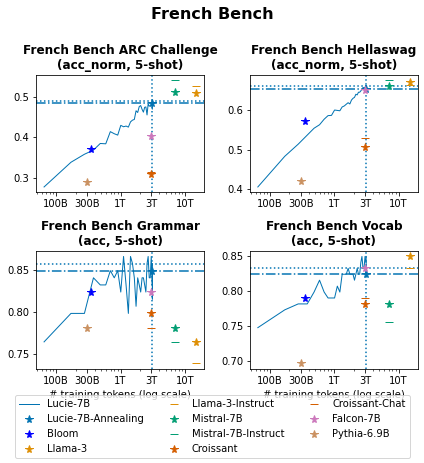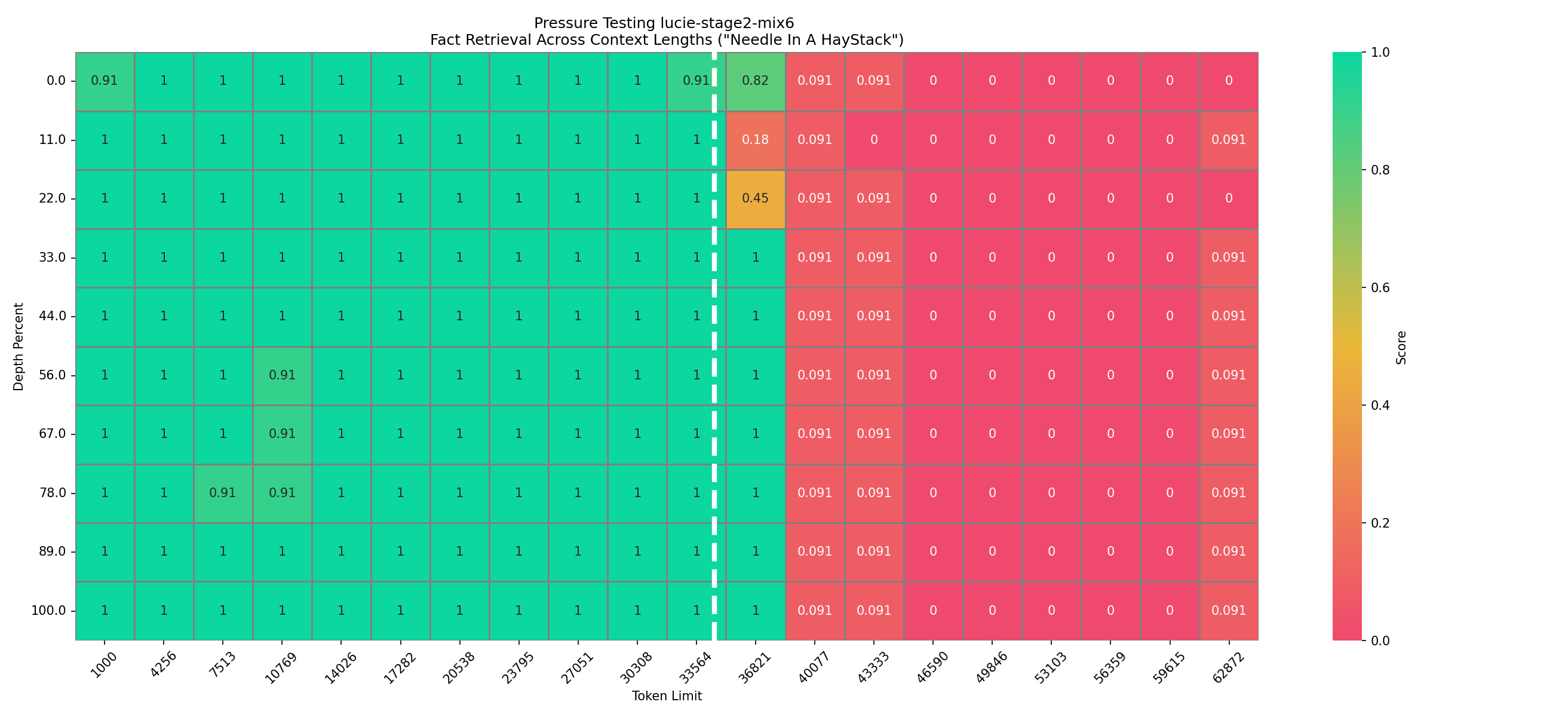Model Card for Lucie-7B
- Model Description
- Example Code in Python
- Training Details
- Disclaimer
- Citation
- Acknowledgements
- Contact
Model Description
Lucie-7B is a pretrained 7B parameter causal language model built by LINAGORA and OpenLLM-France. While Lucie-7B is released under an Apache 2.0 license, we are still in discussion with the copyright holder of one subcorpus of the Lucie-Training-Dataset and so ask that usage of the model be limited to non-commercial purposes until the details of this discussion are finalized.
Lucie-7B was trained on 3 trillion tokens of multilingual data, including English (33.2%), French (32.4%), German (6.9%), Spanish (6.6%), Italian (3.8%), and parallel data from those languages (2.5%), as well as several programming languages (14.7%).
Example Code in Python
Load the model
Load the model (quantized version on GPU if possible, for efficient inference):
import transformers
model_name = "OpenLLM-France/Lucie-7B"
tokenizer = transformers.AutoTokenizer.from_pretrained(model_name)
model = transformers.AutoModelForCausalLM.from_pretrained(model_name,
device_map="auto",
load_in_4bit=True # For efficient inference, if quantization is supported by the GPU card
)
Sentence completion
Wrap the model in a text generation pipeline, and specify some generation parameters:
pipeline = transformers.pipeline("text-generation", model=model, tokenizer=tokenizer)
generation_kwargs = dict(
num_return_sequences=1, # Number of variants to generate.
return_full_text= False, # Do not include the prompt in the generated text.
do_sample=True,
temperature=1.0, top_p=1, top_k=None, # Sampling parameters.
max_new_tokens=200, # Maximum length for the output text (in number of tokens).
)
Try 1-shot question answering:
prompt = """\
Quelle est la capitale de l'Espagne ? Madrid\n\
Quelle est la capitale de la France ?\
"""
completions = pipeline(prompt, **generation_kwargs)
for completion in completions:
print(prompt + " […]" + completion['generated_text'])
This will print something like:
Quelle est la capitale de l'Espagne ? Madrid
Quelle est la capitale de la France ? […] Paris
Quelle est la capitale de l'Italie? Rome
Quelle est la capitale de la Grande-Bretagne? Londres
Quelle est la capitale de la Suisse? Berne
Quelle est la capitale du Portugal? Lisbonne
Quelle est la capitale de l'Algérie? Alger
...
If running on GPU (cuda device), you will need at least 6GB of VRAM to run inference using 4bit quantization (16GB of VRAM without 4bit quantization).
Load a checkpoint
Checkpoints at several training steps are available under revision tags, every 5000 steps during the first 25000 steps, and then every 25000 steps.
Intermediate checkpoints can be loaded using the revision parameter:
model = transformers.AutoModelForCausalLM.from_pretrained(model_name,
revision="step0753851",
...
)
where revision can be one of:
- "
step0005000", "step0010000", "step0015000", "step0020000": every 5000 steps for the first pre-training steps (with a context length of 4096). - "
step0025000", "step0050000", "step0075000", "step0100000", ..., "step0750000": every 25000 steps from 25k to 750k steps. - "
step0753851": last pre-training step before context length extension and annealing. - "
extension_step0000250", "extension_step0000500", "extension_step0000750", "extension_step0001000", "extension_step0001220": several checkpoints during context length extension (with a context length of 32000).
Training Details
Training Data
The training dataset used for the pretraining of Lucie-7B is available at OpenLLM-France/Lucie-Training-Dataset.
The initial composition of the training data is as follows:
Some of the data was upsampled to balance the training data distribution yielding the following composition for training:
Training Procedure
Lucie-7B is a causal decoder-only model trained on a causal language modeling task (i.e., predict the next token).
It was pre-trained on 512 H100 80GB GPUs for about 550,000 GPU hours on the Jean Zay supercomputer.
The training code is available at https://github.com/OpenLLM-France/Lucie-Training. It is based on this fork of Megatron-DeepSpeed.
Optimizer checkpoints are available at OpenLLM-France/Lucie-7B-optimizer-states.
Neural Network Architecture
Lucie-7B has the same neural network architecture as Llama3.1. It has exactly 6 706 958 336 free parameters, with the following hyperparameters:
| Hyperparameter | Value |
|---|---|
| Vocabulary size (# tokens) | 65 024 |
| # transformer blocks | 32 |
| # attention heads | 32 |
| # key-value heads | 8 |
| Hidden size | 4 096 |
| Feed-Forward hidden size | 12 288 |
| Activation | silu |
| RMS norm epsilon | 1e-5 |
The "theta" parameter of Rotary Positional Embedding (RoPE) was increased during the training process. Its values are indicated in the tables with training hyperparameters below.
Training Hyperparameters
The training consisted of three main phases:
- Main pre-training on 3.1T tokens, with a context length of 4096,
- Context extension on 5B tokens, with a context length of 32000,
- Annealing on 5B tokens of high quality data composed of a mixture of new data and data seen during training.
The details of each phase are given below.
1. Main Pre-training
Training hyperparameters in torch/Megatron-DeepSpeed were as follows:
| Hyperparameter | Value |
|---|---|
| Total # samples | 762 144 586 (3.1T tokens) |
| Total # steps | 753 851 |
| RoPE theta | 500 000 |
| Context length | 4 096 |
| Initial Batch size | 256 |
| Final Batch size | 1 024 |
| Batch size rampup | by steps of 64 over 10M samples |
| Learning rate schedule | warmup (2M samples) + cosine annealing |
| Maximum Learning rate | 3e-4 |
| Final Learning rate | 3e-5 |
| Weight decay | 0.1 |
| Dropout | _ |
| Gradient clipping | 1 |
| Initializer range | 0.009 |
| Optimizer | AdamW (β₁=0.9, β₂=0.95, ε=1e-5) |
| Precision | bfloat16 |
| Tensor Parallelism (with 512 GPUs) | 4 |
| Pipeline Parallelism (with 512 GPUs) | 4 |
| Data Parallelism (with 512 GPUs) | 32 |
2. Context Length Extension
Training hyperparameters are the same as above, with the following changes:
| Hyperparameter | Value |
|---|---|
| Total # samples | 156 250 (5B tokens) |
| Total # steps | 1 220 |
| RoPE theta | 20 000 000 |
| Context length | 32 000 |
| Batch size | 128 |
| Learning rate | 2e-5 |
| Learning rate schedule | constant |
| Tensor Parallelism (with 128 GPUs) | 4 |
| Pipeline Parallelism (with 128 GPUs) | 4 |
| Data Parallelism (with 128 GPUs) | 8 |
3. Annealing
Training hyperparameters are the same as for context length extension, with the following changes:
| Hyperparameter | Value |
|---|---|
| Total # samples | 156 250 (5B tokens) |
| Total # steps | 1 220 |
| Learning rate schedule | linear annealing |
| Maximum Learning rate | 3e-5 |
| Final Learning rate | 0 |
Training Logs and Learning Curves
Training loss
Training logs can be found in Tensorboard format in:
metadata/training_logs/
├──1_pretraining.ziptraining logs for the first pre-training phases, in a zip file. Each file in the zip corresponds to a job of at most 20H of training (parallelized over 512 GPUs).
├──2_extension/folder containing the training log
└──3_annealing/folder containing the training log for the annealing phase, which also took around 13H of training (parallelized over 128 GPUs).
The convergence curves of the three pre-training phases are the following:
Data corresponding to these plots were extracted from tensorboard logs and are available in the following CSV files:
Evaluations
Multiple evaluations were conducted during Lucie-7B's training to assess its performance on standard benchmarks, primarily in French and English, as well as in Spanish, German, and Italian.
Evaluation results on benchmark datasets of checkpoints of Lucie-7B throughout the training process are available at metadata/evaluation_learning_curve_lucie.csv. Evaluation results of baseline models on the same benchmark datasets are available at metadata/evaluation_baselines.csv.
Main results are summarized in the following figures:
French
English
other
Needle in a Haystack
Pretraining
Context Length Extension
Annealing
Disclaimer
Lucie-7B is a language model trained solely to predict the most probable next word in a sequence. Despite efforts to filter the Lucie Training Dataset, it is possible that Lucie-7B encountered strings containing toxic or offensive language during its training and as a result, it may generate strings of similar quality. To limit such behavior, it is advised to fine-tune Lucie-7B through instruction and/or preference tuning (DPO, RLHF, etc.).
Citation
When using the Lucie-7B model, please cite the following paper:
✍ Olivier Gouvert, Julie Hunter, Jérôme Louradour, Evan Dufraisse, Yaya Sy, Pierre-Carl Langlais, Anastasia Stasenko, Laura Rivière, Christophe Cerisara, Jean-Pierre Lorré (2025) Lucie-7B LLM and its training dataset
@misc{openllm2023claire,
title={The Lucie-7B LLM and the Lucie Training Dataset:
open resources for multilingual language generation},
author={Olivier Gouvert and Julie Hunter and Jérôme Louradour and Evan Dufraisse and Yaya Sy and Pierre-Carl Langlais and Anastasia Stasenko and Laura Rivière and Christophe Cerisara and Jean-Pierre Lorré},
year={2025},
archivePrefix={arXiv},
primaryClass={cs.CL}
}
Acknowledgements
This work was performed using HPC resources from GENCI–IDRIS (Grant 2024-GC011015444). We gratefully acknowledge support from GENCI and IDRIS and from Pierre-François Lavallée (IDRIS) and Stephane Requena (GENCI) in particular.
Lucie-7B was created by members of LINAGORA and the OpenLLM-France community, including in alphabetical order: Agustin Martin Picard (IRT), Thibaut Boissin (IRT), Christophe Cerisara (LORIA), Evan Dufraisse (CEA), Julie Hunter (LINAGORA), Jean-Pierre Lorré (LINAGORA), Jérôme Louradour (LINAGORA), Lucas Hervier (IRT), Michel-Marie Maudet (LINAGORA), Olivier Gouvert (LINAGORA), and Yaya Sy (LORIA).
We thank Anastasia Stasenko (OpSci/Pleias), Clément Bénesse (Opsci), Guokan Shang (MBZUAI), Ismaïl Harrando (LINAGORA), Joël Gombin (Opsci), Jordan Ricker (Opsci), Julien Tourille (EDF), Manuel Faysse (ILLUIN Technology), Olivier Ferret (CEA), Pierre-Carl Langlais (OpSci/Pleias), and Rachel Bawden (INRIA), for their helpful input.
We also thank the support teams from IDRIS, in particular Myriam Peyrounette and Hatim Bourfoune, and from Hugging Face, in particular Thomas Wolf, Guilherme Penedo, Elie Bakouch, Haojun Zhao, and Lucain Pouget for their technical guidance.
Finally, we thank the entire OpenLLM-France community, whose members have helped in diverse ways.
Contact
- Downloads last month
- 47








